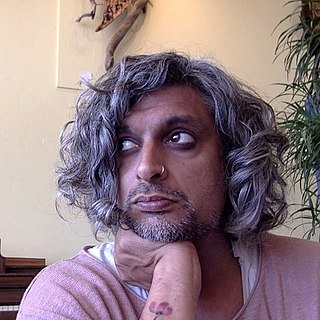
Katherine Womeldorf Paterson is an American writer best known for children's novels, including Bridge to Terabithia. For four different books published 1975–1980, she won two Newbery Medals and two National Book Awards. She is one of four people to win the two major international awards; for "lasting contribution to children's literature" she won the biennial Hans Christian Andersen Award for Writing in 1998 and for her career contribution to "children's and young adult literature in the broadest sense" she won the Astrid Lindgren Memorial Award from the Swedish Arts Council in 2006, the biggest monetary prize in children's literature. Also for her body of work she was awarded the NSK Neustadt Prize for Children's Literature in 2007 and the Laura Ingalls Wilder Medal from the American Library Association in 2013. She was the second US National Ambassador for Young People's Literature, serving 2010 and 2011.

The Tsugaru Strait is a strait between Honshu and Hokkaido in northern Japan connecting the Sea of Japan with the Pacific Ocean. It was named after the western part of Aomori Prefecture. The Seikan Tunnel passes under it at its narrowest point 12.1 miles (19.5 km) between Tappi Misaki on the Tsugaru Peninsula in Aomori Prefecture, Honshu, and Shirakami Misaki on the Matsumae Peninsula in Hokkaido.

The Kroumirie is a mountainous region located in northwestern Tunisia and northeastern Algeria. The region is named after its people, the Khumayr.

Yvonne Vera was an author from Zimbabwe. Her first published book was a collection of short stories, Why Don't You Carve Other Animals (1992), which was followed by five novels: Nehanda (1993), Without a Name (1994), Under the Tongue (1996), Butterfly Burning (1998), and The Stone Virgins (2002). According to the African Studies Center at University of Leiden, "her novels are known for their poetic prose, difficult subject-matter, and their strong women characters, and are firmly rooted in Zimbabwe's difficult past." For these reasons, she has been widely studied and appreciated by those studying postcolonial African literature.
Douglas Tottle is a Canadian trade union activist and journalist, most notable for being the author of the book Fraud, Famine, and Fascism: The Ukrainian Genocide Myth from Hitler to Harvard, which is classified as Holodomor denial literature by the United States Library of Congress.
Patricia ("Pat") Jean McKillop, née Fraser, and now Buckle also simply known as Pat McKillop is a former field hockey player from Zimbabwe, who was a member of the national team that won the gold medal at the 1980 Summer Olympics in Moscow.
Alice Rose Provensen and Martin Provensen were an American couple who illustrated more than 40 children's books together, 19 of which they also wrote and edited. According to Alice, "we were a true collaboration. Martin and I really were one artist."
Zimbabwe Society for the Prevention of Cruelty to Animals is a non-profit organization dedicated to preventing the abuse of animals.
Nicola Davies, earlier known as Nick Davies, is an English zoologist and writer. She was one of the original presenters of the BBC children's wildlife programme The Really Wild Show. More recently, she has made her name as a children's author. Her books include Home, which was shortlisted for the Branford Boase Award, and Poo (2004), which was illustrated by Neal Layton, and was shortlisted for a Blue Peter Book Award in 2006; in the United States, the book is published as Poop: A Natural History of the Unmentionable. Her children's picture book The Promise won the Green Book Award in 2015. She has also written several novels for adults under the pseudonym Stevie Morgan.

Kazim Ali is an American poet, novelist, essayist, and professor. His most recent books are Inquisition and All One's Blue. His honors include an Individual Excellence Award from the Ohio Arts Council. His poetry and essays have appeared in literary journals and magazines including The American Poetry Review, Boston Review, Barrow Street, Jubilat, The Iowa Review, West Branch and Massachusetts Review, and in The Best American Poetry 2007.

Eddie S. Glaude Jr. is an American academic, author, and pundit. He is the James S. McDonnell Distinguished University Professor of African American Studies at Princeton University. He chaired Princeton's Center for African American Studies, 2009-2015, remaining chair as it expanded to its current form, the Department of African American Studies 2015-2023.

Pawprints of Katrina: Pets Saved and Lessons Learned is a non-fiction book written by author and journalist Cathy Scott that documents the author's experience with an animal welfare group and the rescue and reunions of lost animals with their owners in the Gulf region. The book, with a foreword by actor Ali MacGraw, was released in August 2008 on the third anniversary of Hurricane Katrina.

Sy Montgomery is an American naturalist, author, and scriptwriter who writes for children as well as adults.

Tom Angleberger is an American children's writer, best known for the Origami Yoda series. As of March 2013, more than 3.3 million copies of his books had been sold worldwide. Angleberger lives in Virginia with his wife, Cece Bell, who is also a children's author.
The LC Linked Data Service is an initiative of the Library of Congress that publishes authority data as linked data. It is commonly referred to by its URI: id.loc.gov.
Amia Srinivasan is a philosopher and author noted for her work in epistemology and feminist philosophy. Since January 2020, she has been Chichele Professor of Social and Political Theory at the University of Oxford.
Livia (Knaul) Kohn is an emeritus professor of Religion and East Asian Studies at Boston University, specializing in studies of Taoism.
Catherine Hezser is Professor of Jewish Studies at the School of Oriental and African Studies, University of London. She specialises in rabbinic Judaism, the early history of Judaism in the Near Middle East, and the social history of the Jews in Roman Palestine during late antiquity.
Catherine Alison Geissler, Lady Auld is a prominent British nutritionist and author and co-author of widely recognised reference textbooks on human nutrition.
Anne B. Poyntz was an eighteenth-century English writer, thought to have been born between 1701 and 1750. She is author of Je ne sçai quoi: or, A collection of letters, odes, &c., Never before published. By a Lady [Anne B. Poyntz], published in 1769.








